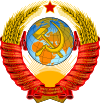Vlas Chubar
Vlas Chubar | |
|---|---|
 | |
| People's Commissar for Finance | |
| In office 16 August 1937 – 19 January 1938 | |
| Premier | Vyacheslav Molotov |
| Preceded by | Hryhoriy Hrynko |
| Succeeded by | Arseny Zverev |
| 2nd Chairman of the Council of People's Commissars of the Ukrainian SSR | |
| In office 15 July 1923 – 28 April 1934 | |
| Premier | Alexey Rykov |
| Preceded by | Christian Rakovsky |
| Succeeded by | Panas Lyubchenko |
| Candidate member of the 14th, 15th, 16th, 17th Politburo | |
| In office 3 November 1926 – 1 February 1935 | |
| Personal details | |
| Born | Vlas Yakovlevich Chubar 10 February 1881 Fedorovka, Yekaterinoslav Governorate, Imperial Russia |
| Died | 26 February 1939 (aged 58) Moscow, Union of Soviet Socialist Republics |
| Political party | RSDLP (1907-1912) Russian Communist Party (1912-1938) |
| Education | Alexander Mechanics and Technical College |
| Profession | Economist |
Vlas Yakovlevich Chubar (Ukrainian: Влас Якович Чубар; Russian: Вла́с Я́ковлевич Чуба́рь) (22 February [O.S. 10 February] 1891 – 26 February 1939) was a Ukrainian Bolshevik revolutionary and a Soviet politician. Chubar was arrested during the Great Terror of 1937-38 and executed early in 1939.
The top Communist Party official in the Ukraine during the 1932-33 famine, Chubar was posthumously held culpable for those events by a Ukrainian court in 2010.
Early career
Chubar was from an ethnic Ukrainian family.[1] He was born in Fedorovka, Yekaterinoslav Governorate, Russian Empire (now in Polohy Raion, Zaporizhia Oblast, Ukraine). Chubar became a Marxist revolutionary early in life and joined the Bolshevik faction of the Russian Social Democratic Labor Party in 1907. He rose through the ranks during the Russian Civil War and became a member of the Central Committee of the Soviet Communist Party in 1921. On July 13, 1923 Chubar replaced Christian Rakovsky as Chairman of the Ukrainian Sovnarkom. He became a candidate (non-voting) member of the Central Committee's Politburo in November 1926.
The Great Purge

In 1934 Chubar was transferred to Moscow, where he became Deputy Chairman of the national Council of People's Commissars and Deputy Chairman of the USSR Council of Labor and Defense. In February 1935 Chubar was made a full member of the Politburo. He briefly served as the Soviet People's Commissar of Finance between August 16, 1937 and January 19, 1938. In 1938 Chubar was appointed the chief of the Solikamsk construction for the GULAG of Soviet Commissariat of Interior. There he was arrested during the Great Purge in June 1938 and executed in February 1939. The Soviet government cleared Chubar of all charges during the first wave of destalinization in 1955.
Holodomor
In 2010, a Ukrainian criminal court concluded that Chubar, along with other leaders of Soviet Ukraine, bore personal responsibility for the Holodomor.[2]
References
- ^ Magocsi, Paul R. (2010). A History of Ukraine: The Land and Its Peoples. University of Toronto Press. p. 574. ISBN 1442610212.
- ^ http://apcourtkiev.gov.ua/control/uk/publish/article?art_id=41962&cat_id=35857
External links
- 1891 births
- 1939 deaths
- People from Polohy Raion
- People from Yekaterinoslav Governorate
- Ukrainian people in the Russian Empire
- Old Bolsheviks
- Politburo of the Central Committee of the Communist Party of the Soviet Union members
- Communist Party of Ukraine (Soviet Union) politicians
- Soviet Ministers of Finance
- Members of the Supreme Soviet of the Soviet Union
- Great Purge victims from Ukraine
- Ukrainian people executed by the Soviet Union
- Soviet rehabilitations
- Chairpersons of the Council of Ministers of Ukraine
- Holodomor
- Soviet politician stubs

